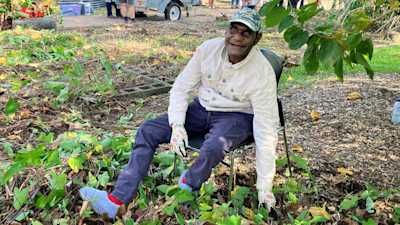Terry now has more tools to help him live a better quality of life.

Image: Terrence sits on his bed, giving a thumbs up and smiling at the camera.
Terry has an independent nature and values his freedom. His favourite pastime is going out and about in his community, exploring wherever he wants, on his own. When Terry’s mobility started to decline rapidly, it was not only physically painful, but it also had a big impact on Terry’s happiness and well-being.
Terry has chronic pain, and couldn’t stand up straight without suffering. The debilitating condition was controlling his life and he was transferred to three separate hospitals in a matter of three weeks as different specialists tried to help him.
When Terry came home from the hospital with a walker, required to use for pain management, it curbed his ability to travel freely. He found it hard to understand why nothing was making him feel better.
Terry's support team took it upon themselves to become well-versed in Terry’s diagnosis and how it affects him. They were able to help Terry find ways to reduce his discomfort and manage his health issues.
Despite the challenges he experienced, Terry did not give up doing what he could to improve his health. He worked with his support team to maintain his independence, and his team also ensured to look after his mental health as well.
Before his mobility declined, Terry did not rely on the National Disability Insurance Scheme (NDIS) intervention and support from allied health professionals. His chronic pain means he now requires more services to meet his needs.
Terry’s Life Without Barriers Support Coordination team found an appropriate Occupational Therapist to work with Terry. The Occupational Therapist was able to secure more funding to address Terry's changed support needs.
Thanks to a successful adjustment of his NDIS plan, Terry now has more support to help him live a better quality of life.
Terry also sees a myotherapist, who gives him great pain relief, and a physiotherapist to help him improve muscular strength. The therapists engaged a pain specialist and rheumatologist to support the management of his ongoing condition as well.
With his pain being managed, Terry and his team are now working towards regaining more of his former independence again.
What is support coordination?
Through the NDIS, you can choose your supports and which providers you work with. While it’s a good thing, it can be challenging – that’s where support coordination comes in.
A support coordinator can help you activate your NDIS plan and access your supports. They’ll connect you with people and services in your community and help you understand your options.
Connect with a support coordinator near you here.
How can a Support Coordinator help you?
Your Life Without Barriers Support Coordinator can help you:
Understand and make the most of your NDIS plan
Find providers for the supports you’re funded for
Work towards your goals
Access healthcare and education services
Participate more in your community
Look for a job
Work through your accommodation needs
Develop the confidence to coordinate your own supports, if that’s a goal of yours.


